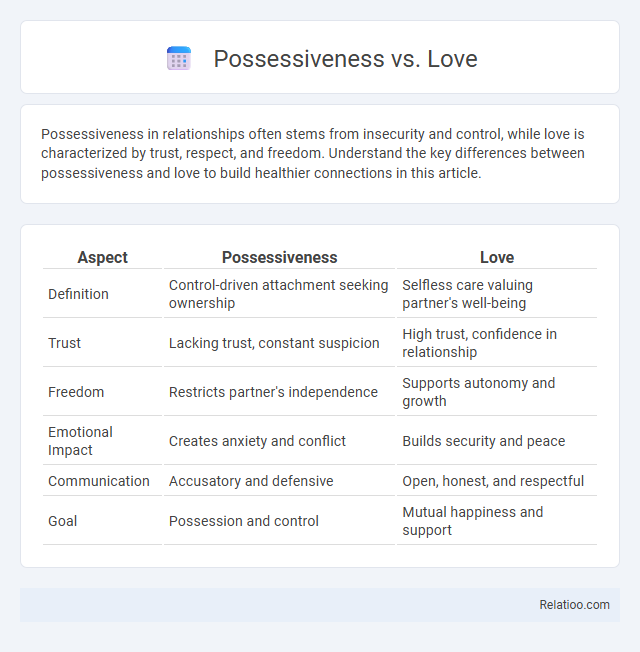Possessiveness in relationships often stems from insecurity and control, while love is characterized by trust, respect, and freedom. Understand the key differences between possessiveness and love to build healthier connections in this article.
Table of Comparison
| Aspect | Possessiveness | Love |
|---|---|---|
| Definition | Control-driven attachment seeking ownership | Selfless care valuing partner's well-being |
| Trust | Lacking trust, constant suspicion | High trust, confidence in relationship |
| Freedom | Restricts partner's independence | Supports autonomy and growth |
| Emotional Impact | Creates anxiety and conflict | Builds security and peace |
| Communication | Accusatory and defensive | Open, honest, and respectful |
| Goal | Possession and control | Mutual happiness and support |
Understanding the Difference: Possessiveness vs Love
Understanding the difference between possessiveness and love is essential for healthy relationships, as love is rooted in trust, respect, and freedom, while possessiveness stems from fear, insecurity, and control. Love nurtures your partner's growth and independence, whereas possessiveness restricts and suffocates emotional expression. Recognizing these traits helps you foster genuine connection and avoid toxic behaviors that can harm relational harmony.
Defining Healthy Love in Relationships
Healthy love in relationships is characterized by mutual respect, trust, and emotional support, where both partners feel secure and valued without fear of control. Possessiveness, often stemming from insecurity, can undermine this foundation by creating jealousy and restricting individual freedom. You can foster a strong, loving connection by prioritizing open communication and recognizing the difference between caring deeply and trying to control your partner.
Signs of Possessiveness in a Partner
Signs of possessiveness in a partner include constant jealousy, frequent questioning about your whereabouts, and attempts to control your interactions with others. Your partner may isolate you from friends and family, exhibit anxiety when you spend time away from them, and react aggressively to perceived threats. Recognizing these behaviors early helps you maintain healthy boundaries and prioritize genuine love over unhealthy control.
Emotional Security: Love or Control?
Emotional security in relationships hinges on genuine love, which fosters trust, respect, and mutual growth, whereas possessiveness often masks insecurity and a desire for control. You can nurture emotional well-being by recognizing the difference between healthy affection and controlling behavior that restricts personal freedom. Prioritizing love over possessiveness strengthens bonds through emotional support rather than fear or confinement.
How Possessiveness Impacts Relationship Growth
Possessiveness can hinder relationship growth by creating trust issues and emotional insecurity between partners, leading to increased conflicts and reduced communication quality. While love fosters mutual respect and understanding, possessiveness often manifests as control and jealousy, which stifles personal freedom and emotional development. Your ability to recognize and manage possessiveness is crucial for nurturing a healthy, evolving relationship built on respect and genuine connection.
The Role of Trust in True Love
True love thrives on a foundation of trust, where your partner's freedom and individuality are respected without fear of loss or betrayal. Possessiveness, in contrast, stems from insecurity and a lack of trust, leading to control and emotional restriction rather than mutual growth. Understanding the critical role of trust helps differentiate genuine love from possessive behavior, fostering a healthy and supportive relationship.
Psychological Roots of Possessiveness
Psychological roots of possessiveness often stem from insecurity, fear of abandonment, and low self-esteem, which can distort genuine expressions of love. Possessiveness manifests as a controlling behavior aimed at reducing personal anxiety by dominating a partner, contrasting with love's foundation of trust and respect. Understanding these underlying emotional triggers is crucial for addressing unhealthy attachment patterns and fostering healthier relationship dynamics.
Transforming Possession into Healthy Attachment
Transforming possessiveness into healthy attachment involves recognizing and respecting individual autonomy within a relationship while maintaining emotional closeness. This shift encourages trust and mutual support, replacing control and jealousy with open communication and empathy. Establishing boundaries promotes a secure connection where love thrives without the constraints of possessive behavior.
Setting Boundaries for a Loving Relationship
Setting boundaries in a loving relationship involves distinguishing healthy love from possessiveness, where love respects individuality and trust, while possessiveness seeks control and creates insecurity. Clear communication about personal space, emotional needs, and mutual respect fosters a secure bond that nurtures growth without domination. Establishing limits ensures both partners feel valued and free, reinforcing a balanced dynamic rooted in genuine affection rather than fear or jealousy.
Cultivating Love Without Possessiveness
Cultivating love without possessiveness requires embracing trust, respect, and emotional independence in relationships, which fosters genuine connection and mutual growth. Differentiating between possessiveness, marked by control and insecurity, and love, centered on care and freedom, is crucial for healthy bonds. Mindful communication and self-awareness help partners nurture love that empowers rather than confines, enhancing emotional intimacy and long-term relationship satisfaction.

Infographic: Possessiveness vs Love
 relatioo.com
relatioo.com